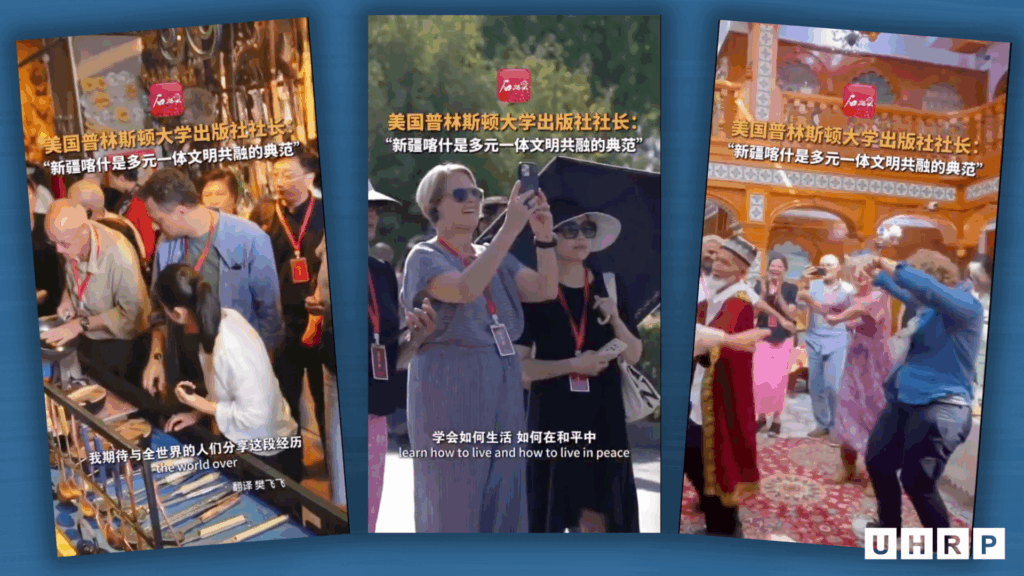Princeton University Press’ Trip into Chinese State Propaganda Erasing Atrocities, and How They Can Support Uyghur Intellectuals

July 7, 2025
A UHRP Insights column by Dr. Henryk Szadziewski, Director of Research, and Peter Irwin, Associate Director for Research and Advocacy
In June 2025, a group of Princeton University Press (PUP) representatives participated in a state-arranged visit to the Uyghur Region. PUP claimed the intention of the trip was to build “inclusive cross-cultural interactions.” Yet such language not only obscures extensive documentation of the grave human rights situation for Uyghurs, but also helps normalize the Chinese state’s false narrative claiming that all is well in the region.
The visit has drawn criticism from Uyghur activists and U.S. academics. Participation in highly managed state tours of the Uyghur Region is not a neutral act. It contributes to the Chinese government’s disinformation strategy—one that aims to reframe the region as harmonious and revitalized as a result of state policies. China is very much interested in outside actors appearing to endorse the Uyghur Region as cleansed of “extremism” and open for tourists and investors.
Enlisting a university press in this campaign is no doubt a coup for the architects of the Uyghur genocide. The authorities’ goal with these visits is not “cultural exchange,” but international legitimacy. And that legitimacy is most effectively secured when it comes with the endorsement of overseas institutions. When PUP representatives visit government-sanctioned museums or watch choreographed dance performances, their presence lends validation to the state’s projected reality.
There is little ambiguity about the human rights situation in the region. Since 2017, survivors, researchers, journalists, governments and UN bodies have documented an expansive campaign of repression targeting Uyghurs and other Turkic peoples. Mass internment, family separation, forced sterilization, religious persecution, and coerced labor have all been clearly documented.
These are not isolated incidents; they constitute what many experts—and several governments—recognize as crimes against humanity, and in some assessments, genocide. If you are wondering whether the situation has improved, a January 2025 report by Rian Thum for the US Holocaust Museum’s Simon-Skjodt Center for the Prevention of Genocide found that “[a]ll of the state policies that have led to accusations of atrocity crimes in the Uyghur Region either continue or are currently expanding.”
In the face of these charges, the Chinese government has not sought dialogue or transparency. Instead, it has shaped a counter-narrative: one of stability, modernization, and cultural celebration. Central to this narrative are tightly controlled tours for foreign delegations, especially for journalists, diplomats, and scholars.
In a statement, PUP notes that three of its representatives joined a tour of Special Book Award of China (SBAC) recipients sponsored by the China National Publications Import and Export Corporation (CNPIEC), an entity with which PUP publicly collaborates. What is missing from the statement is that CNPIEC is state-owned and the book award state-administered. That’s the very state responsible for atrocity crimes. PUP acknowledges its visit was used for propaganda; however, knowing that state entities were behind the arrangements and still going ahead with the visit is naïve and lacks judgment.
What makes PUP’s statement about the visit to the Uyghur Region more troubling is the silence about the true condition of Uyghur cultural and intellectual life. As an academic publisher, PUP depends on the free exchange of ideas, yet it chose to participate in a state-curated narrative while the very authors and scholars it might publish—poets, historians, folklorists—are imprisoned and silenced.
Rahile Dawut, a scholar of Uyghur sacred geography and intangible cultural heritage, was sentenced to life in prison in 2018, but her whereabouts and the fact of her sentencing remained unknown until 2023. Ilham Tohti, an economist who advocated for interethnic dialogue and understanding, remains in prison serving a life sentence. Ilham’s family has also been denied any official information about his whereabouts and physical and health conditions.
Two Uyghur scholars, Abdullah Qazanchi and Abduweli Ayup, publishing with the Uyghur Human Rights Project in 2021, confirmed the detention of 312 Uyghur and other Turkic Muslim intellectual and cultural elites, concluding the targeting of Uyghur scholars and artists constituted the erasure of a non-state organized version of Uyghur identity.
In the context of a state-sponsored persecution of Uyghur intellectuals, any claims to “inclusive cross-cultural interactions” in the Uyghur Region are a stretch to say the least. True exchange requires unmediated and equal participation. The Uyghur Region is not a site of benign cultural curiosity. It is a region under intense state control, where scholarly and artistic voices have been forcibly silenced.
Now that the PUP delegation has concluded its visit, what follows?
First, PUP should review internal guidelines for international visits, particularly in regions where rights are denied. Second, an additional statement of support for Uyghur writers, scholars, and artists who have been detained or disappeared would send a powerful message.
Further, PUP should commit to publishing, translating, or promoting the work of Uyghur intellectuals in exile, many of whom continue to write and speak with courage, as well as the books of Uyghur authors banned in China. Last, support for organizations focused on Uyghur intellectual freedom, such as Uyghur PEN, would demonstrate a principled stand in defense of freedom of thought and expression.
While the Princeton University Press visit to the Uyghur Region is highly problematic, what it chooses to do next has just as much significance.
